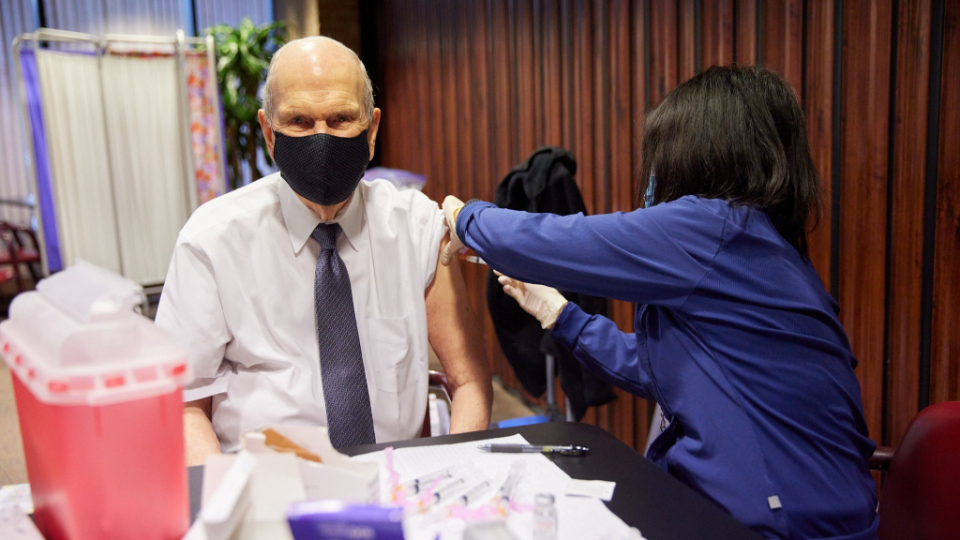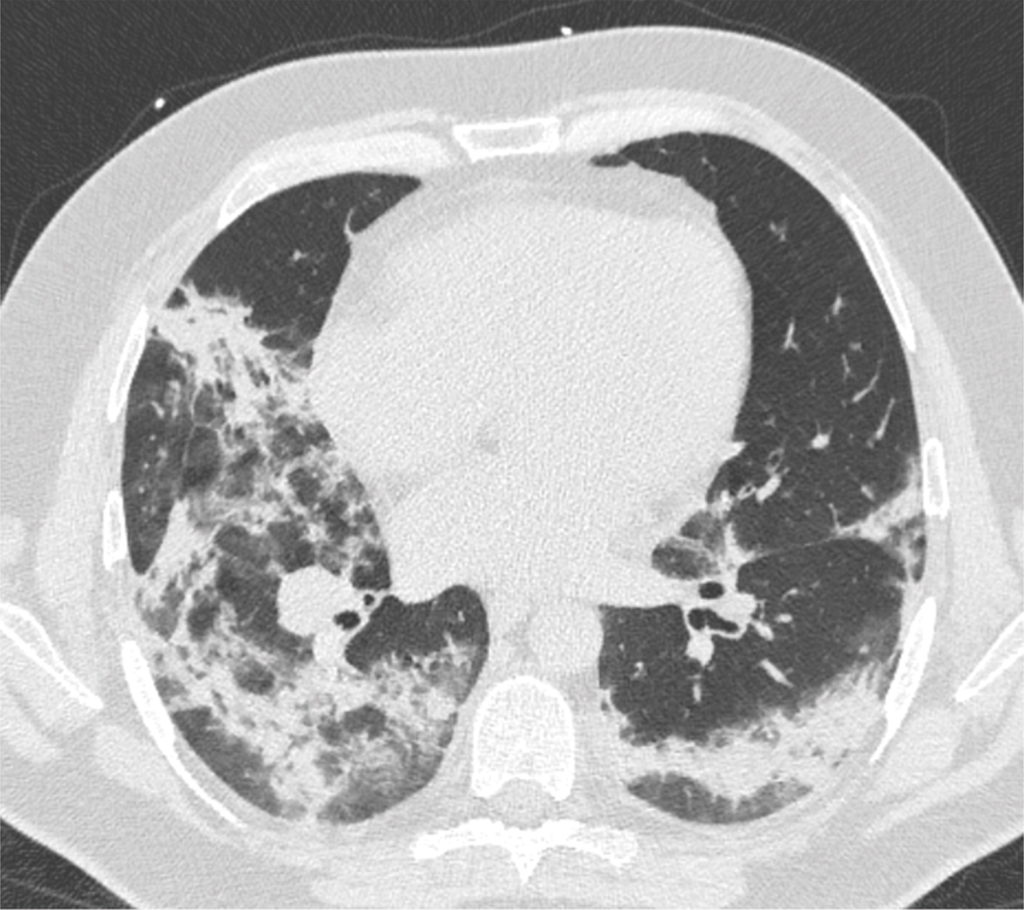What is this “pro tip” that is almost universally practiced by doctors? Receiving the COVID-19 vaccine.

In addition to being a faithful Latter-day Saint, I’m a physician. I have many doctor friends. The statistic referenced in the title (which came from this AMA survey) matches what my anecdotal experience tells me — doctors are getting vaccinated. Among my doctor friends there is a wide range of political opinions, ranging from avowed socialists to gun-toting libertarians and everything in between. On a host of other COVID-19 related topics, these friends have extremely diverse opinions. And yet when it comes to getting the vaccine, there is broad consensus.
This might seem like a strange topic to discuss on a Latter-day Saint apologetics blog, but given the reaction by some members of the church to the recent First Presidency statement urging vaccination, I’d like to offer some thoughts on why I believe there is near-universal vaccination among US physicians.
In this post, I’ll discuss three factors I believe contribute: (1) Understanding the science behind the vaccine; (2) anecdotal experience of physicians, and (3) awareness of public health data. In each of these three areas, physicians have a unique perspective worth taking a closer look at.
Understanding the Science Behind the Vaccine
New technology can be exciting or scary, depending on your point of view. When it comes to the mRNA vaccines offered to the public in the battle against COVID-19, understanding how the virus affects your body (and how the vaccine counters this) can help dispel concerns about receiving the vaccine. This understanding can also help explain why the vaccine is proving to be remarkably safe and effective among the hundreds of millions of individuals who have received it so far. Medical school includes an in-depth education on how the body fights off infection, how vaccines work, and how viruses cause disease. Physicians understand the risks associated with leaving yourself exposed. This section will give a short overview of the science behind the disease and its potential remedy.
Spike Proteins
Much has been said about the “spike protein” found on the surface of the virus. The spike protein acts like a skeleton key of sorts to gain entry to the cells lining your respiratory tract. Once inside, the virus hijacks your cell’s machinery and replicates itself until the cell ruptures and releases many new viruses, which go on to infect nearby cells. This process is exponential — one virus becomes many with each new cycle. Until your immune system recognizes the threat and mounts an effective response (which can take days or weeks), the virus is free to continue multiplying throughout your body.
How the mRNA Vaccine Works
That’s where the mRNA vaccines come into the picture. The vaccine doesn’t contain the spike protein itself, rather, it contains messenger RNA (mRNA) instructions to build the spike protein of the COVID-19 virus (the skeleton key) in a tiny lipid bubble which allows it to gain entry into your cells. When the vaccine is injected into your arm, some of the mRNA makes it into your cells and your cells convert those instructions into spike proteins. This gives your body a head-start in learning how to recognize and destroy the virus. A few weeks later, the second dose amplifies the response. Once you are fully immunized, your body is on the lookout for spike protein. If you get exposed, instead of having to wait days or weeks for your body to mount a defense, your immune system can kick into high gear right away.
In other words, both the virus and your immune system’s defenses multiply exponentially. This is one reason why vaccination is so important — it gives your immune system a massive head start in fighting off the infection.
Safety
Because the vaccine contains no active virus — only instructions to allow your own body to produce a piece of the virus — there is little risk of serious complications. So far, no long-term side effects have been reported (https://www.cdc.gov/coronavirus/2019-ncov/vaccines/expect/after.html). And unlike other vaccines which contain inactivated toxins (such as the tetanus, pertussis, and diphtheria vaccines) or weakened live virus (such as the chickenpox vaccine), these mRNA vaccines do not expose you to anything harmful.
Anecdotal Experience
What I understand about the science behind the vaccine helps me recommend it. What I’ve seen in my own practice of medicine in addition to reports from colleagues strengthens my confidence in the effectiveness and safety of the vaccine.
For most of the first year of the pandemic, before any vaccines were available, I saw the effects of the virus on the human body on a daily basis. I’m a diagnostic radiologist, which means I look at CT scans and x-rays. It became clear to me early on that this virus was dangerous. Images like this came across my monitors on a regular basis (source):

One need not be a medical imaging expert to see the impact of the virus on human lung tissue. This is a CT image of the chest. The dark areas are healthy lungs and the patchy white areas are diseased lung tissue caused by viral pneumonia. This is the damage done by the virus in the time it takes the immune system to learn how to detect and destroy it.
My own observations aligned with reports from colleagues on absolutely devastating cases. The doctors I know took this virus seriously from the very start. As we learned more and more about it, hopes about an effective vaccine began to climb. Some wise decisions by various scientists, private companies, and government leaders brought us a set of vaccines in a very short amount of time. President Russell M. Nelson was right when he said: “We have prayed often for this literal godsend. As a former surgeon and medical researcher, I know something of the effort needed to accomplish such a remarkable feat. Producing a safe, effective vaccine in less than a year is nothing short of miraculous.” (source)
The vaccines have undoubtedly saved many lives. When I ask my physician colleagues about the impact of the vaccines, I get a consistent reply — they work. They prevent serious illness better than any other measure currently available.
Sadly, I still see images like the one above on a regular basis. Each time I do, I lament that the individual is unvaccinated. Many news reports carry a similar message — people who convinced themselves that the virus wouldn’t affect them come to regret the decision to wait. (Here is one such example.)
Safety
Anecdotally, I haven’t encountered any evidence of the vaccines causing harm. Furthermore, if the vaccines were causing significant harm, such a fact could not be kept secret from the public for a variety of reasons. First, the story would be very newsworthy. An extremely rare possible complication associated with the Johnson and Johnson made global headlines. Second, the doctors I know would not keep such a fact secret. If they were seeing this, or even suspecting it, we would know. We have good reason to believe the vaccines are safe.
Public Health Data
Finally, in addition to the underlying science and my anecdotal experience, the statistics on vaccine efficacy match up as well. I could reference many different figures, but I see one statistic as key in telling the story of the vaccines: the most recent CDC data shows that of 166 million fully vaccinated people in the US, only 0.005% (1 in ~20,000) have been hospitalized for COVID-19.
Conclusion
I hope what I’ve written here has been informative and helped you see why I have no reservations in recommending the vaccine to everyone who is eligible. The harmony I see between scientific theory, anecdotal experience, and public health data bolsters my confidence in the vaccines. I am grateful for the recent First Presidency statement urging vaccination. Each individual who has yet to contract the disease or receive the vaccination has a decision to make regarding his or her initial exposure to the COVID-19 spike protein. Would you rather have it presented to your body through vaccination, allowing your body time to prepare to fight the virus should you be exposed? Or would you rather wait until the virus shows up and catches your immune system off-guard?
I pray each of us will carefully consider the prophetic counsel we’ve been given and act accordingly.
 Jeff Markham joined FAIR as a volunteer in 2020. By profession, he is a diagnostic radiologist. He served as a full-time missionary in the Germany Hamburg Mission from 1996-1998. His favorite callings include teaching primary and early morning seminary. He lives in the Dallas area with his wife and children. He blogs at BookofMormonNotes.com.
Jeff Markham joined FAIR as a volunteer in 2020. By profession, he is a diagnostic radiologist. He served as a full-time missionary in the Germany Hamburg Mission from 1996-1998. His favorite callings include teaching primary and early morning seminary. He lives in the Dallas area with his wife and children. He blogs at BookofMormonNotes.com.

This is a well written, informative, and helpful post. Thank you!
Well said, Jeff.
As a fellow Latter-day Saint physician, thank you for stating so well what I’ve been trying to communicate to anyone who will listen for the last 8 months.
Wonderful, I have shared on social media. Thanks
The article is comforting, and makes me feel that my early decision to get vaccinated was reasonable. However, it glosses over exactly the question that I most want answered: “some of the mRNA makes it into your cells and your cells convert those instructions into spike proteins”. My question is, _which_ cells? Nearby muscle tissue? Vascular tissue? Bone marrow? Lymph nodes? And, what is the long-term effect on that tissue? When do the cells stop producing spike proteins? Why?
Peter: Great questions. I wanted to include more detail but had to consider the overall length of the article, too. The muscle cells in your arm take up the messenger RNA and produce the spike protein. They stop producing it once the mRNA that was injected breaks down (within a few days). The proteins stay around for a few weeks, giving your body time to react to them and train your immune system to recognize and destroy them.
There is no long-term affect on the cells from making the spike protein — all cells are constantly making proteins depending on their tissue type, and the immune system is constantly checking what is going on to look for foreign antigen.
This article gives a little more detail if you’re interested: https://www.nebraskamed.com/COVID/where-mrna-vaccines-and-spike-proteins-go
Article is well written. But it didn’t talk about how many people have died from taking the Covid vaccination?
Wouldn’t that be something that would be an important topic?
I feel like I addressed that when I said there were to serious long term side effects, but if you’d like more details, see this page:
https://www.cdc.gov/coronavirus/2019-ncov/vaccines/safety/adverse-events.html
The government requires any death following vaccine to be reported so it can be fully investigated. So far, 6789 such reports have been made (0.0019% of people receiving the vaccine). This includes death of any cause. According to the CDC:
“A review of available clinical information, including death certificates, autopsy, and medical records, has not established a causal link to COVID-19 vaccines.”
This also fits with my own clinical experience and reports I’ve received from colleagues. If people were being seriously hurt by the vaccine in large numbers, there would be no way to hide that information. It would be headline news. The CDC does acknowledge that three deaths from blood clots may be connected to the Johnson & Johnson vaccine (not an mRNA vaccine which was the focus of this article).
I hope that information helps you!
Thank you very much for this article, which came at a time that I needed it as I am planning on being vaccinated asap. Do you recommend one over the others. I am 61 and live in Australia, so it is likely to be AstraZeneca for me. The option for under 60s is Pfizer, but over 60s can get Pfizer in some instances.
Thanks again for an article that a lot of people need to see.
What about those who have already had covid? Do they need the vaccine? Or will their immune system give them enough protection?
Hope- this is an interesting comment. Natural immunity definite provides some degree of protection but it depends on the level of exposure. So far, it looks to me that the vaccine is providing a superior and more long-term antibody response than natural immunity. I believe that will mean lower chances those who are vaccinated will get as sick with the variants which will inevitably keep popping up.
Thanks for the kind words I’m glad you’ve chosen to be vaccinated. There are several factors to consider when deciding which vaccine to get, but that’s a discussion that should be had between you and your doctor.